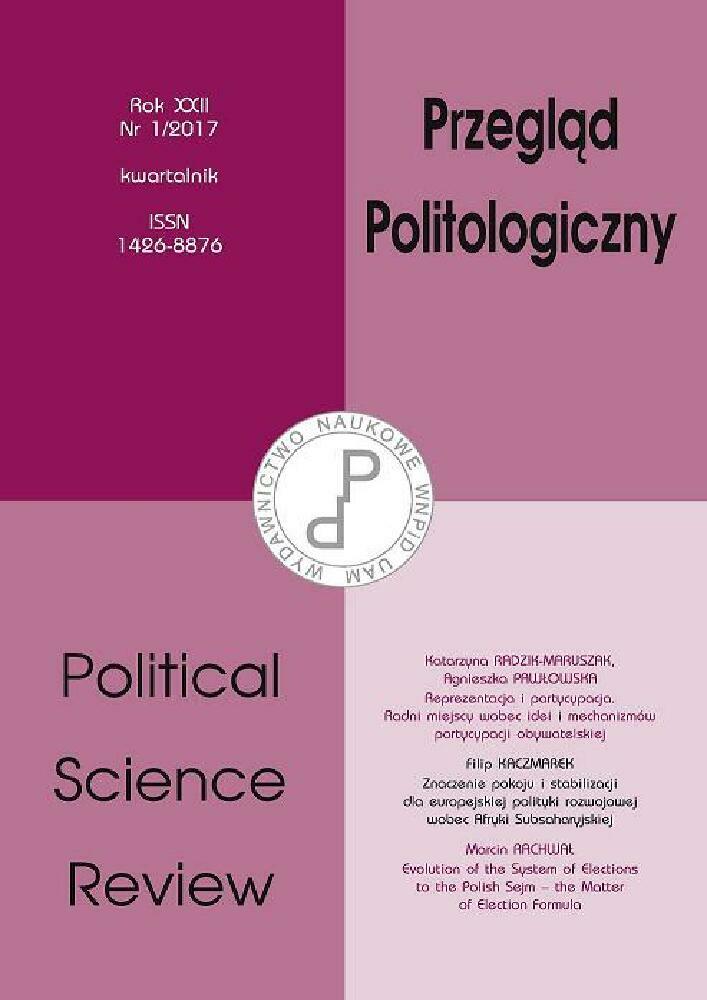Abstract
Polish security as a subject and object of public discourse is typically reduced to the military security of the state. Research has indicated, however, that a majority of Poles have a different approach to security (primarily caring for their well-being and social matters within their immediate surroundings), which actually conforms to the system of private and collective values. This paper illustrates the extent to which the way the ordinary people understand security differs from the official language employed by generals, politicians and other experts. The analysis of selected samples of the official security discourse conducted in this paper leads to the conclusion that this discourse uses three different language variations producing fundamental communications obstacles. These variants include the dominant jargon of professional officers in command and officers-instructors, an administrative and official language and an abstract language of academic experts who examine international relations. The paper is written from the point of view of critical security theory and is based on the results of representative surveys of Poles.
References
Bartmiński J. (red.) (2006), Język, wartości, polityka. Zmiany rozumienia nazw wartości w okresie transformacji ustrojowej w Polsce. Raport z badań empirycznych, Wydawnictwo UMCS, Lublin.
Biała księga bezpieczeństwa narodowego Rzeczypospolitej Polskiej (2013), Biuro Bezpieczeństwa Narodowego, Warszawa.
Bigo D. (1998), L’Europe de la sécurité intérieure, Penser autrement la sécurité [Europe of Internal Security, Thinking Security Differently], w: Entre Union et Nation. L’Etat en Europe [Between Union and Nation, the State in Europe], red. A.-M. Le Gloannec, Presses de Sciences Po, Paris, s. 55–90.
Bigo D. (2000), When Two Become One: Internal and External Securitisations in Europe, w: International Relations Theory and the Politics of European Integration, Power, Security and Community, red. M. Kelstrup, M. C. Williams, Routledge, London, s. 171 205.
Booth K. (1991), Security and Emancipation, „Review of International Relations” 17 (4), s. 313–326.
Buzan B. (1984), Peace, Power, and Security: Contending Concepts in the Study of International Relations, „Journal of Peace Research”, 21(2), s. 109–125.
Buzan B., Wæver O., de Wilde J. (1998), Security: A New Framework for Analysis, Lynne Rienner, Boulder, CO.
C.A.S.E. Collective (2006), Critical Approaches to Security in Europe: A Networked Manifesto, SAGE Publications, vol. 37(4), p. 443–487, http://sdi.sagepub.com.
Deklaracja końcowa – I Kongres Języka Urzędowego, Senat RP, 31.10.2012, http://www.jezykurzedowy.pl/pl/I-Kongres.
Diagnoza społeczna 2015. Warunki i jakość życia Polaków, raport (2015), red. J. Czapiński, T. Panek, Rada Monitoringu Społecznego, Warszawa.
EB 84 (2015), Standard Eurobarometer, Public opinion in the European Union, First Results, Autumn, European Union, http://ec.europa.eu/public_opinion/index_en.htm.
EB/EP 84.1 (2015), Eurobarometr Parlamentu Europejskiego, Główne wyzwania dla UE, migracja oraz sytuacja gospodarcza i społeczna, cz. I, Unia Europejska, jesień, http://ec.europa.eu/public_opinion/index_en.htm.
Informacja o zadaniach polskiej polityki zagranicznej w 2016 r. (2016), wystąpienie Ministra Spraw Zagranicznych Witolda Waszczykowskiego, Sejm RP, http://www.tvn24.pl/minister-waszczykowski-w-sejmie-cale-wystapienie,614739,s.html.
Kołodziej J. (2011), Wartości polityczne. Rozpoznanie, rozumienie, komunikowanie, Księgarnia Akademicka, Kraków.
McDonald M., Browning Ch. S. (2013), The future of critical security studies: Ethics and the politics of security, „European Journal of International Relations”, June 1, vol. 19, s. 235–255.
McDonald M. (2008), Securitization and the Construction of Security, „European Journal of International Relations”, December, vol. 14, 4, s. 563–587.
Pisarek W. (2002), Polskie słowa sztandarowe i ich publiczność, Ośrodek Badań Prasoznawczych, Kraków 2002.
Popper K. R. (1947), The Open Society and its Enemies, 2nd ed., vol. 2, ch. 21, The High Tide of Prophecy: Hegel, Marx, and the Aftermath, George Routledge and Sons Ltd., London.
Sheehan M. (1999), Community, Anarchy and Critical Security, Paper for the ECPR Joint Sessions workshop Redefining Security, Mannheim, 26–31 March 1999, http://www.anarchist-studiesnetwork.org.uk/documents/Anarchy_and_Security.doc.
Taylor Ch. (2010), Nowoczesne imginaria społeczne, przeł. A. Puchejda, K. Szymaniak, Wydawnictwo Znak, Kraków.
Wæver O. (2004a), Peace and Security: Two Concepts and Their Relationship, w: Contemporary Security Analysis and Copenhagen Peace Research, red. S. Guzzini, D. Jung, Routledge, London, s. 53–65.
Wæver O. (2004b), Aberystwyth, Paris, Copenhagen: New „Schools” in Security Theory and Their Origins Between Core and Periphery”, paper presented at the 45th Annual Convention of the International Studies Association, Montreal, Canada, 17–20 March.
Wyn J. R. (1999), Security, Strategy, and Critical Theory, Lynne Rienner, London.
